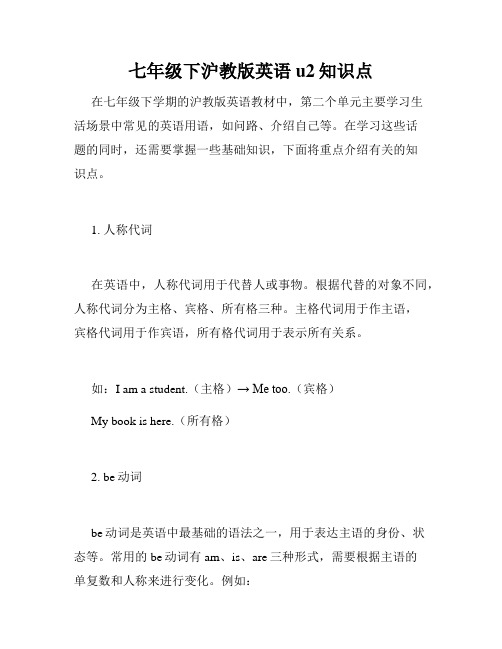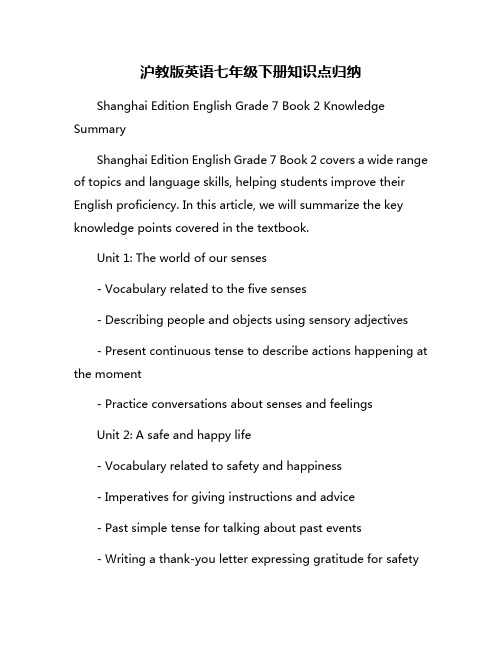七年级下册沪教版知识点
七年级下沪教版英语知识点

七年级下沪教版英语知识点七年级下学期的英语学习是很重要的一段时间,因为学生在这一学期将会学习很多新的知识点。
在沪教版的英语课程中,这些知识点被分为不同的模块,包括语音、词汇、语法和阅读。
下面将会介绍每一个模块的主要知识点,以帮助学生更好地掌握英语知识。
一、语音语音是英语学习的基础,因此在七年级下英语学习中也是不可少的一部分。
以下是主要的语音知识点:1.元音字母的发音,例如"a"、"e"、"i"、"o"、"u"和“y”等。
2.辅音字母的发音,包括浊音和清音。
浊音包括"b"、"d"、"g"、"v"、"z"、"j"和"w"等,清音包括"p"、"t"、"k"、"f"、"s"、"h"和"q"等。
3.辅音字母组合的发音,例如"sh"、"th"、"ch"、"ng"、"wh"和"qu"等。
二、词汇词汇是英语学习中的重要组成部分,因为它能帮助学生更好地理解和表达英语语言。
以下是主要的词汇知识点:1.单词的拼写和发音,例如颜色、动物、食物、服装和家庭成员等。
2.常见的短语和表达方式,例如问候语、感谢和道歉等。
3.基本的数字和时间表达,例如年份、月份、星期和时刻等。
三、语法语法是英语学习中的重要组成部分,因为它能帮助学生更好地理解和表达英语语言。
以下是主要的语法知识点:1.基本的句型和语法结构,例如陈述句、疑问句、否定句等。
2.名词和代词的用法,例如单数和复数形式、所有格、主格和宾格等。
沪教版七年级英语下册各单元知识点

沪教版七年级英语下册知识点探索In this article, we will delve into the key language points and concepts found in the lower secondary English textbook published by the Shanghai Education Press, specifically targeting the seventh grade. This journey through the units of the textbook will not only provide a solid foundation in English language skills but also foster a deeper understanding of the cultural and contextual elements embedded within each lesson.**Unit 1: Getting to Know You**The first unit introduces students to basic self-introductions and interactive conversations. Key vocabulary includes adjectives describing personal qualities, such as "friendly," "outgoing," and "hardworking." Students learn to use present tense verbs correctly in the context of describing themselves or others. Grammar focus is on subject-verb agreement and adjective usage.**Unit 2: My Family and Friends**This unit expands on social interactions by introducing family members and friends. Students learn to recognize anduse vocabulary related to family members, such as "uncle," "aunt," and "cousin." They also practice using the present continuous tense to describe actions and activities. Additionally, they are introduced to the concept of possessive pronouns.**Unit 3: My School Life**School life becomes the focus of Unit 3, introducing vocabulary related to school subjects, activities, and schedules. Students learn to use the present simple tense to describe routines and habits. Grammar emphasis is placed on the correct use of prepositions and article changes.**Unit 4: Hobbies and Activities**Hobbies and extracurricular activities are explored in Unit 4, encouraging students to talk about their interests and preferences. New vocabulary covers a range of activities, from sports to artistic pursuits. Students practice using the future tense to express plans and intentions. This unit also introduces modal verbs to express possibility and necessity.**Unit 5: Health and Body**The topic of health and the human body is addressed in Unit 5, covering vocabulary related to physical well-being and exercise. Students learn to discuss healthy habits and routines using the present tense and adjective comparisons. Grammar focus is on using adverbs to describe manner and degree.**Unit 6: Holidays and Festivals**The final unit of the textbook delves into the world of holidays and festivals, introducing vocabulary specific to different cultural celebrations. Students learn to describe festival traditions and activities using the past tense. This unit also covers conditional sentences, allowing students to express hypothetical situations and consequences.Throughout these units, students not only acquire language skills but also gain a deeper understanding of cultural differences and the importance of communication in everyday life. The blended approach of English language learning with cultural understanding prepares students for more advanced language challenges and global interactions. **沪教版七年级英语下册知识点探索**本文将对上海教育出版社出版的七年级下册英语教材中的关键知识点和概念进行深入探讨。
沪教牛津版初中英语七年级下册Unit 6知识点梳理

沪教牛津版初中英语七年级下册Unit 6知识点梳理单词electricity n.电[ɪlekˈtrɪsɪti]conversation n.谈话[ˌkɒnvəˈseɪʃən]identify v.确认 rule n.规则[ruːl]anyone pron.任何人['enɪwʌn]reply v.回答[rɪ'plaɪ]foolish adj.愚蠢的[ˈfuːlɪʃ]wire n.电线[ˈwaɪə]connect v.(使)连接[kə'nekt]cable n.电缆['keɪbl]moment n.瞬间,片刻['məʊmənt]battery n.电池[ˈbætəri]cooker n.厨灶,炉具[ˈkʊkə]fridge n.冰箱[frɪdʒ]bulb n.灯泡[bʌlb]lock n.(用锁)锁上[lɒk]test v.测试[test]tidy v.使整洁,使整齐['taɪdi]touch v.触摸,碰[tʌtʃ]a packet of 一袋in a way 在某种程度上(be)connected to 连接到power station 发电站washing machine 洗衣机switch off 关(电灯、机器等)tidy up 收拾妥,整理好air conditioner 空调Unit6课文与视频Electricity all around周围的电One evening, Daisy said, "I'm going to buy a packet of sweets.一天晚上,黛西说,"我要去买一包糖果。
Does anyone want anything?"有人想要什么东西吗?"Benny, Daisy's brother, replied, "Can you get me a packet of electricity?"本尼,黛西的哥哥回答说,"你能给我带一包电吗?""Yes, I can," said Daisy. Then she went out."是的,我能,"黛西说。
七年级下沪教版英语u2知识点

七年级下沪教版英语u2知识点在七年级下学期的沪教版英语教材中,第二个单元主要学习生活场景中常见的英语用语,如问路、介绍自己等。
在学习这些话题的同时,还需要掌握一些基础知识,下面将重点介绍有关的知识点。
1. 人称代词在英语中,人称代词用于代替人或事物。
根据代替的对象不同,人称代词分为主格、宾格、所有格三种。
主格代词用于作主语,宾格代词用于作宾语,所有格代词用于表示所有关系。
如:I am a student.(主格)→ Me too.(宾格)My book is here.(所有格)2. be动词be动词是英语中最基础的语法之一,用于表达主语的身份、状态等。
常用的be动词有am、is、are三种形式,需要根据主语的单复数和人称来进行变化。
例如:I am a student.He is my friend.They are students.3. 物主代词物主代词是用来表示所属关系的代词,常见的有my、your、his、her、its(表示物)、our、their等。
如:This is my book.That pencil is yours.The football belongs to him.4. 介词英语中的介词用于表示位置、时间、方式等关系,在句子中常常和其他词搭配使用。
如:He is sitting on the chair.I have an English class at 9 o'clock.We go to school by bus.5. 时间表达时间的表达方式有很多种,包括点钟时间、时间段、日期等。
在口语交流中,使用得比较多的是点钟时间和时间段。
例如:It's 2 o'clock.We have a break from 10 to 10:15.Today is September 1st.以上就是七年级下沪教版英语u2知识点的介绍。
通过学习这些基础知识,可以更好地理解和掌握生活场景中常见的英语用语,进而提高英语口语表达和交流能力。
沪教版初中英语七年级下册Unit 4知识点梳理

沪教版初中英语七年级下册Unit 4知识点梳理必考短语和句型1.save vt. 拯救;解救Eg. Let’s do something to save the animals in danger.The police saved the child from the fire.【拓展】save “节省、储蓄”Eg. save money save time【变形】safe adj. safety n.2.discuss vt “讨论” 后接名词(短语)或wh-从句及wh-短语discussion n.Eg. We discussed the problem.We will discuss who should do it.We will discuss what to teach next term.3.leaf n. “树叶”复数:leavesEg. The fall of one leaf is enough to tell the coming of autumn. 一叶知秋。
The leaves turn green in spring. 变绿4.help+do = help + to do “帮忙做……”help+名词+(to)do“帮(某人)做……”Eg. I helped (to) wash the car.I helped him (to) look for his key.【拓展】help+with...或help+名词+with... “在某方面帮忙”Eg.Can I help you with your work?Can you help me with my homework, Mary?5.fight for...“为……而战”fight过去式:foughtfight against “与……作斗争”Eg. He is fighting against his sickness.They fight for freedom.6.provide sb. with sth. = provide sth. for sb.提供给某人……,为某人提供……Eg. Sheep provide us with wool. = Sheep provide wool for us.7.in many ways“在许多方面”【短语】by the way 顺便说一下in a way 在某种程度上in the way of sb. 妨碍某人on the way to...在去……的途中in this way 用这种方法8.keep “使维持(某种状态)”keep+名词+形容词Eg. The noise kept him awake.keep+名词+副词/介词短语Eg. Don’t keep the boy outside/ in the room.keep +名词+doingEg. She kept me waiting for half an hour.9.take in... “接受……,吸收……”Eg. The kind man would like to take in the poor boy.Fish take in oxygen through their gills.鱼用鳃吸氧气10.breathe[i:] v. 呼吸breath[e] n.11.make 普通用词,指任何东西的制造或制造过程Eg.He made the desk himself.produce 正式用词,除表示大量生产制造外,还表示创造Eg. The tree will produce some blossom next year.12.in fact 实际上,事实上。
沪教版英语七年级下册知识点归纳

沪教版英语七年级下册知识点归纳Shanghai Edition English Grade 7 Book 2 Knowledge SummaryShanghai Edition English Grade 7 Book 2 covers a wide range of topics and language skills, helping students improve their English proficiency. In this article, we will summarize the key knowledge points covered in the textbook.Unit 1: The world of our senses- Vocabulary related to the five senses- Describing people and objects using sensory adjectives- Present continuous tense to describe actions happening at the moment- Practice conversations about senses and feelingsUnit 2: A safe and happy life- Vocabulary related to safety and happiness- Imperatives for giving instructions and advice- Past simple tense for talking about past events- Writing a thank-you letter expressing gratitude for safetyUnit 3: Getting around- Vocabulary related to traveling and transportation- Asking for and giving directions using prepositions and landmarks- Present simple tense for talking about habits and routines- Role-playing conversations at the travel agency and on the streetUnit 4: Growing up- Vocabulary related to growing up and milestones in life- Using comparatives and superlatives to compare people and things- Future simple tense for making predictions and plans- Describing ambitions and future career goalsUnit 5: Sharing the planet- Vocabulary related to environmental issues and conservation- Modal verbs for expressing obligation and possibility- Present perfect tense for talking about experiences and actions connected to the present- Group discussions on environmental topics and solutionsUnit 6: At work- Vocabulary related to jobs and professions- Using conditional sentences to express hypothetical situations- Using phrasal verbs and collocations in job interviews- Writing a CV and cover letter for a job applicationUnit 7: Cultural heritage- Vocabulary related to cultural traditions and customs- Using reported speech to convey information and opinions- Active and passive voice for presenting and discussing cultural practices- Researching and presenting on cultural heritage and preservationUnit 8: Good health- Vocabulary related to health and well-being- Modal verbs for giving advice and suggestions- Present perfect continuous tense for talking about activities that started in the past and continue to the present- Dialogues on healthy lifestyles and routinesUnit 9: Friends and family- Vocabulary related to relationships and emotions- Using indirect questions and polite requests in social situations- Gerunds and infinitives for expressing preferences and intentions- Role-playing family gatherings and friendly conversationsUnit 10: Life in the future- Vocabulary related to technology and innovation- Modal verbs for future predictions and possibilities- Review of verb tenses and sentence structures covered in previous units- Writing a short essay on the future of technology and its impact on societyOverall, Shanghai Edition English Grade 7 Book 2 provides a comprehensive language learning experience, encompassing all four language skills – listening, speaking, reading, and writing. By mastering the key knowledge points summarized in this article, students can enhance their English proficiency and communication abilities.。
【K12学习】七年级语文下册《社戏》知识点复习沪教版

七年级语文下册《社戏》知识点复习沪教版
一、重点字词
.给下列加点字注音。
归省xǐng惮dàn欺侮ǔ撺cuān掇duo
凫fú水篙gāo橹lǔ撮cuō
棹zhào楫jí行háng辈
点拨:注意多音字"省""行"等字的读音。
.解释下列句中加点的词语。
这十多个少年,委实没有一个不会凫水的。
委实:实在。
他们换了四回手,渐望见依稀的赵庄。
依稀:隐隐约约。
那声音大概是横笛,宛转,悠扬,使我的心也沉静,然而又自失起来,觉得要和他弥散在含着豆麦蕴藻之香的夜气里。
自失:忘了自己。
.用恰当的词语填空。
母亲送出来吩咐"要小心"的时候,我们已经点开船,在桥石上一磕,退后几尺,即又上前出了桥。
点拨:所填词语是表现开船的一系列动作的动词。
二、重点句子背记知识清单
两岸的豆麦和河底的水草所发散出来的清香,夹杂在水气中扑面的吹来;月色便朦胧在这水气里。
淡黑的起伏的连山,仿佛是踊跃的铁的兽脊似的,都远远地向船尾跑去了,但我却还以为船慢。
三、文学常识背记知识清单
《社戏》选自《呐喊》,体裁是短篇小说。
七年级沪教版数学知识点

七年级沪教版数学知识点七年级沪教版数学是初中阶段的数学教材,包含了多个知识点,例如整数、分数、代数式、方程等等。
下面将对这些知识点进行详细介绍。
一、整数知识点整数是数学中最基本的概念之一。
在初中阶段,学生需要掌握整数的四则运算、判断大小关系、约数、倍数等基本概念和方法。
同时,还需要掌握正数、负数、零的含义及其在数轴上的位置。
二、分数知识点分数也是初中阶段数学教材中的一个重要知识点。
学生需要掌握分数的基本概念、分数的化简、比较大小、加减乘除等基本运算法则,还需要掌握分数的小数表示、百分数表示、万分数表示以及它们之间的相互转化方法。
三、代数式知识点代数式是初中阶段数学教材中相对较难的一个知识点。
学生需要掌握代数式的含义、基本形式、展开及化简、合并同类项、提公因式等方法。
同时,还需要了解一元一次方程及其解法以及一元一次不等式及其图像表示等基本知识。
四、方程和不等式知识点方程和不等式也是初中阶段数学教材中的重要知识点。
学生需要掌握一元一次方程及其解法、一元二次方程及其解法等基本知识,并且需要将问题转化为方程或不等式求解。
同时,还需要掌握一元一次不等式及其解法、二元一次方程及其解法等知识。
五、几何知识点几何是初中阶段数学教材中的一项重要内容,包括平面几何和立体几何。
学生需要掌握线段、角、三角形、平行四边形、梯形、圆等几何图形的基本概念和性质,同时需要掌握几何图形的计算方法和解题技巧。
六、统计与概率知识点统计与概率是初中阶段数学教材的最后一个知识点。
学生需要掌握频率、频数、中位数、均值等统计基本概念和方法,需要了解概率的基本概念、概率的计算方法和统计实验的设计和分析方法。
以上是七年级沪教版数学教材中的几个主要知识点。
学生需要在课堂上认真听讲,认真完成每个章节的练习题和测试题,只有通过不断练习,才能掌握这些知识点,为更高级的数学知识打下坚实的基础。
- 1、下载文档前请自行甄别文档内容的完整性,平台不提供额外的编辑、内容补充、找答案等附加服务。
- 2、"仅部分预览"的文档,不可在线预览部分如存在完整性等问题,可反馈申请退款(可完整预览的文档不适用该条件!)。
- 3、如文档侵犯您的权益,请联系客服反馈,我们会尽快为您处理(人工客服工作时间:9:00-18:30)。
七年级下册沪教版知识点
沪教版七年级下册是初中学习生涯中非常重要的一部分,其中
的知识点涉及到数学、语文、英语、科学和历史等课程,下面将
分别介绍这些课程中的重要知识点。
数学
1. 分数的加减乘除
分数是初中数学中的基础知识,而加减乘除分数则是分数的基
本运算。
学生需要掌握分数的基本概念和分数运算法则,并能灵
活运用到实际的数学问题当中。
2. 有理数的加减乘除
有理数是数学中一个重要的概念,包括正数、负数、分数和零。
在初中阶段,学生需要掌握有理数的加减乘除四种运算法则,建
立起对有理数的整体认识。
3. 平面图形的认识
平面图形是初中数学中的重要知识点,包括三角形、四边形、
多边形等。
学生需要学习这些平面图形的定义、性质以及分类。
语文
1. 语文常识
语文常识是初中语文中的基础知识,包括语文学科的性质、语
言文字的功能、语文修辞手法等等。
学生需要认真学习这些常识,建立起对语文学科的整体认识。
2. 作文基础知识
作文是初中语文中的重要知识点,包括作文的类型、结构、内
容和写作方法等等。
学生需要掌握这些基础知识,以便能够写出
高质量的作文。
3. 古诗文和现代诗歌
古诗文和现代诗歌是初中语文中的重要课程内容,学生需要学会欣赏这些文学作品,并善于从中汲取对自己作文的启示。
英语
1. 语法基础知识
语法基础知识是初中英语中的基础知识,包括句子的成分、时态、语态、语气等等。
学生需要掌握这些基础知识,从而能够写出正确的英语句子和短文。
2. 词汇
词汇是初中英语中的重要知识点,学生需要掌握一定数量的英语单词,并善于运用这些单词到日常的英语交流当中。
3. 阅读能力
阅读能力是初中英语中的重要能力,学生需要通过大量的英语阅读来提高自己的阅读能力,并善于从阅读当中汲取对自己英语学习的启示。
科学
1. 科学常识
科学常识是初中科学中的基本知识,包括科学发展的历史,科学方法、科学思想以及科学实验等方面的知识。
学生需要掌握这些基本常识,了解科学的重要性和科学研究的过程。
2. 物质和能量
物质和能量是初中科学中的重点知识点,学生需要了解物质和能量的基本概念和相关性质,并能灵活运用到物理、化学等科学领域中。
3. 生命科学
生命科学是初中科学中的另一个重点知识点,包括生命起源、
生物遗传、生物进化和生物多样性等方面的知识。
学生需要通过
实验和观察等方式来加深对这些知识点的理解。
历史
1. 历史常识
历史常识是初中历史中的基础知识,学生需要了解历史的性质、历史知识体系以及历史研究的方法等方面的内容。
2. 古代文明
古代文明是初中历史中的重点知识点,包括古代中国、古代埃及、古希腊罗马等方面的内容。
学生需要掌握这些古代文明的历
史背景、发展轨迹以及文化特点。
3. 近代史
近代史是初中历史中的另一重点知识点,学生需要了解近代中国和世界上一些重要国家的政治、经济、文化等方面的发展历史和现状。
